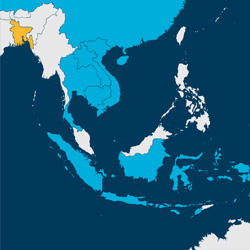Bangladesh Integrated Water Resources Assessment
2011–2014
 CSIRO is helping address the challenges of efficient and equitable water allocation and use in Bangladesh.
CSIRO is helping address the challenges of efficient and equitable water allocation and use in Bangladesh.
- The development challenge
- Our approach
- Project achievements
- Key lessons
- Project outputs
- Partners
- Publications
The development challenge
Climate change, increasing population and economic growth are expected to increase the demand for water resources in Bangladesh. However, the quantity and quality of its surface water and groundwater resources may also be negatively affected by climate change and economic development. There is a real risk of reduced access to safe drinking and irrigation water, and groundwater could become contaminated by saltwater and polluted surface waters. To examine the issues, researchers from Australia and Bangladesh have conducted a collaborative integrated biophysical and socio-economic study to provide a national overview of water resources and to describe the impacts of development and climate change on both surface water and groundwater. The study assessed how these impacts affect the poor and vulnerable, and how they affect the amount of water available for and used by different economic sectors such as agriculture, industry and households. The project helped build capacity in Bangladesh organisations and aimed to provide policy and management options to enable Bangladesh decision makers to equitably and efficiently allocate and use water in the future.
Our approach
This project addressed knowledge gaps identified in Bangladesh’s National Water Management Plan (NWMP) in climate change impacts, groundwater resources at the national scale, and how surface water and groundwater resources interact. Our integrated water resources / socio-economic assessment provides a national overview of water resources and identifies the impacts of development and climate change on surface water and groundwater resources, and on poor and vulnerable people.
The project assessed the amount of water that could be sustainably supplied to the different economic sectors—such as agriculture, fisheries, industry and navigation—and to the population for drinking and sanitation purposes, to promote economic growth and improve people’s livelihoods. By bringing together hydrological, hydro-geological, socio-economic, climatic and social data into a spatial model, we assessed the impact of climate change scenarios and exploring development scenarios.
The project team communicated policy options that underpin a more equitable and economically efficient use of Bangladesh’s water resources.
Project achievements
- Providing advice for future National Water Policy including information on the groundwater sustainability issue, as well as enabling better use of river modelling for the dry season. The assessment examined water resources from both biophysical and socio-economic perspectives and exposed several key issues and knowledge gaps, including that sustainable levels of ground water use are generally not known. The project highlighted that food security is achievable although there will be challenges, such as a reduction in land available for agriculture and a projected increase in flooding and salinity intrusion.
- Skills were strengthened with the project building capacity of Bangladesh organisations in integrated water resources assessment including assessment of socio-economic impacts of climate change and future water demand due to population growth.
- Publication of journal papers and reports with multiple in-country partner papers, journal papers, two conference papers and a final ‘big messages’ report, which was presented at a workshop in Bangladesh attended by the Minister for Water Resources.
Key lessons
The integrated assessment is helping to address the knowledge gaps identified in Bangladesh’s National Water Management Plan. Management options identified will help Bangladesh authorities develop policy responses to equitably and efficiently allocate and use water.
We increased the capacity of local and national water institutions to:
- carry out an integrated water resources assessment
- downscale the future climate data and assess the impact of climate change
- apply advanced remote sensing technologies for water demand assessment
- assess large-scale groundwater resources
Project outputs
The project outcomes and related outputs included:
- an overview of surface water and groundwater resources in Bangladesh
- an overview of the existing socio-economic and political constraints and limitations affecting the efficient and equitable use and distribution of surface water and groundwater in Bangladesh
- an estimate of surface water and groundwater demand for selected economic sectors of Bangladesh under scenarios of development and climate change
- an integrated framework of surface water and groundwater resources and their interactions with social and economic wellbeing
The project identified potential hotspots:
- areas where there is high risk of contamination by saltwater or polluted surface waters
- areas where there is high risk of lack of access to safe drinking water and irrigation water in rural regions
- the most vulnerable region/area, economic sector, and population group due to water scarcity, quality, management scenarios and climate change
Project partners
- Bangladesh Water Development Board (BWDB)
- Water Resources Planning Organisation (WARPO)
- Institute of Water Modelling (IWM)
- Bangladesh Institute of Development Studies (BIDS)
- Centre for Environmental and Geographic Information Service (CEGIS)
- Australian Department of Foreign Affairs and Trade (DFAT)
Publications
Evaluation of project – ![]() 2-page fact sheet
2-page fact sheet
Evaluation of project – ![]() 8-page brochure
8-page brochure
Bangladesh Integrated Water Resources Assessment: final report, 2014
Banerjee, O., Mahzab, M.M., Raihan, S., Islam, N., 2015. An economy-wide analysis of climate change impacts on agriculture and food security in Bangladesh. Climate Change Economics, 6 (1), 1550003. DOI: 10.1142/S2010007815500037
Banerjee, O, Mahzab, MO, Asaduzzaman, M 2015. Towards 2021: examining alternative growth scenarios for Bangladesh. Bangladesh development Studies, 38 (1), 77-99.
Kirby, J.M., Ahmad, M.D., Mainuddin, M., Palash, W., Qadir, M.E., Shah-Newaz, S.M., Hossain, M.M., 2015. R The impact of irrigation development on regional groundwater resources in Bangladesh. Agricultural Water Management 159: 264–276.
Kirby J.M., Mainuddin M., Mpelasoka F., Ahmad M.D., Palash W., Qadir M.E., Shah-Newaz S.M., Hossain M.M. The impact of climate change on regional water balances in Bangladesh. For Climatic Change (submitted to journal, in review).
Mohammed Mainuddin, Mac Kirby, Rehab Ahmed Raihan Chowdhury, S. M. Shah-Newaz, 2015. Spatial and temporal variations of, and the impact of climate change on, the dry season crop irrigation requirements in Bangladesh. Irrigation Science, 33 (2), 107-120.
Mainuddin, M. and Kirby, M. 2015. National food security in Bangladesh to 2015. Food Security, 7:633-646 DOI 10.1007/s12571-015-0465-6
Ahmad, Mobin-udDin, Kirby, Mac, Islam, Mohammad Shahidul, Hossain, Md.Jakir, Islam, Md.Masbahul (2014) Groundwater Use for Irrigation and its Productivity: Status and Opportunities for Crop Intensification for Food Security in Bangladesh. Water Resources Management, 28:1415–1429 DOI 10.1007/s11269-014-0560-z
Ahmad, M.-u. D., Kirby, M., Islam, M.S., Poulton, P., Hossain, M.J., and Islam, M.M., Groundwater use for irrigation and its productivity: status and opportunities for crop intensification to achieve food security in Bangladesh. 1st International conference on food security, Amsterdam, 29th Sept – 2nd Oct 2013.
Banerjee, O., Mahzab, M.M., Raihan, S. and Islam, N.K.K., 2012. Food Security and Climate Change in Bangladesh: An Economy-Wide Analysis. Presented at the 15th Annual Conference on Global Economic Analysis, June 27-29, Geneva, Switzerland








